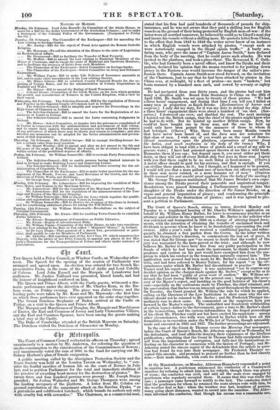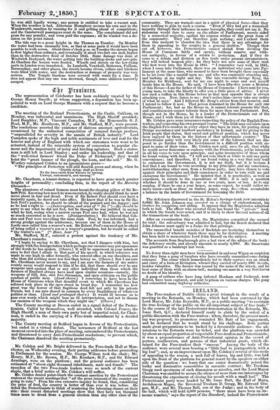t4r Zttrupulis.
The Court of Common Council reelected its officers on Thursday ; agreed unanimously to a motion by Mr. Anderton, for referring the question of smoke-consumption to the consideration of the Commissioners of Sewers ; and unanimously voted the sum of 5001. to the fund for carrying out Mr. Sidney Herbert's plan of female emigration. A public meeting called by the Aborigines Protection Society and the Peace Society was held at the London Tavern on Wednesday, to "con- sider the fearful sacrifice of human life on the coast of Borneo in July last, and to petition Parliament for the total and immediate abolition of the practice of awarding head-money for the destruction of pirates." Be- tween three and four hundred persons were present : Mr. Joseph Sturge presided ; Sir Joshua Walmsley and Mr. George Thompson were among the leading occupants of the platform. A letter from Mr. Cobden ex- pressed reprobation of the sanguinary attack on the Sarebas Dynks, "as a gratuitous and coldblooded butchery, which brands its authors not only With cruelty but with cowardice." The Chairman, as a commercial man, stated that his firm had paid hundreds of thousands of pounds for ship.. insurance, and he was not aware that they paid a shilling less for English vessels on the ground of their being protected by F.nglish men-of-war : if the latter were all scuttled tomorrow, he believed he could go to Lloyd's next day and insure his vessels without a :drilling more. He quoted a letterfrom China, to the effect that from 1845 to 1848 the writer never knew of an instance in which English vessels were attacked by pirates, " except such as were notoriously engaged in the illegal opium traffic." A burly sea- faring man who gave the name of " Captain Aaron Smith," here declared from the body of the meeting, that he could prove such attacks. He was invited to the platform and took a place there. The Reverend R. C. Grib- ble, who had formerly teen a naval officer, and knew the Dyaks and their prahus, declared his opinion that the means resorted to for putting down piracy in the Eastern seas would increase the danger of the sailor's pro- fession there. Captain Aaron Smith now stood forward, on the invitation of the Chairman, just to say that he had been attacked by pirates in the China seas, at midnight, by a fleet of prahus—no mere " baskets," but boats manned by a hundred men each, and rowed by seventy or eighty oars.
He had navigated those seas thirty years, and the pirates had cost him many a sleepless night. Bound from Sourabaya tie China on the 30th of April 1836, Mr. Smith was set upon by twenty of these pirates. "We had a three hours' engagement, and during that time I can tell you I killed as many men in proportion as Rajah Brooke. (Reek:mations of horror anti surprise.) I only did any duty, for it was my duty to defend my ship. After a three hours' engagement there were about a hundred of 'em shot. (Sen- sation.) I destroyed one crew, and disabled the rest. The next morning I hoisted out the British ensign, that the chief of the pirates alight know who he had to do with. But he hoisted up another Bntish ensign. Now, he could'ut have bought one in those seas, and the one he held up could only have been gained by the massacre of those to whom it had belonged. (Cheers.) Why, there have been many Manila vessels that have never been heard of, and the Java seas are notorious for thatches of men. I wish any of you would go on the coast of Borneo. (Great consternation upon the platform, expressions of horroxjkont the ladies, and much confusion in the body of the room.) Why, I have been obliged to land with a brace of pistols and a sword at my side to procure water; I have had poisoned spears thrown at me like a wild beast. Humanize them if you can ; but depend noon it, you must either put them down, or they will cut off every British ship that goes in those seas. I agree with you that there ought to be no such thing as head-money. (Cheers.) A naval officer should be paid for his services, and that is enough. If you can civilize these pirates, do it ; but I thought, as I happened to be present, I would tell you that a more gallant race of men than our officers and sailors in these seas never existed, or a more humane set of men." (Captain Smith resumed his seat amidst great applause from the body of the meeting.) Mr. George Thompson maintained that Sir James Brooke's own expe- rience among the Dyaka proved their peaceable and nnpiratical temper. Resolutions were passed demanding a Parliamentary inquiry into the slaughter of the Dyn.ks under the direction of Sir James Brooke, on vague and general imputation of piracy ; and condemning the principle of head-money for the destruction of pirates ; and it was agreed to pre" sent a petition to Parliament.
The Court of Queen's Bench, sitting in banco, devoted Monday and Tuesday to a lengthened hearing of Mr. Charles Wilkins's application on behalf of Mr. William Henry Barber, for leave to recommence practice as an attorney and solicitor in the superior courts. Mr. Barber is the solicitor who was convicted and transported in 1844 on a charge of uttering forged docu- ments, with the intention of obtaining the transfer of unclaimed stock and dividends to persons whom he knew to be fraudulently representing the real owners. After a year's exile he received a conditional pardon and subse- quently he obtained a free pardon from the Crown. In the later written under Sir George Grey's direction, to communicate the last act of grace, it was stated that Sir George saw "no reason to doubt that the verdict of the jury was warranted by the facts proved at the trial ; and although he now beheves Mr. Barber to have been flee from any guilty participation in the frauds of which he had been made the instrument, he thinks that greater prudence and caution on his part would have exempted him from the sus- picion to which his conduct in the transaction naturally exposed him." The application now pressed had been made by Mr. Barber's counsel in a former term, and had been referred to Master Turner, for his report "on the cir- cumstances under which Mr. Barber had discontinued to practise." Master Turner read his report on Monday : it was understood "not to express any decided opinion on the charges made against Mr. Barber," except so far as to say that he had been "guilty of great Inuit of caution." Mr. Wilkins ad- dressed the Court during Monday on the general case ; impugning the accu- racy of the Master's report, and Insisting on the good features of his client's case—especially on the confessions made by Fletcher, the chief criminal, and his asseveration that Barber was an innocent agent throughout the transaction. On Tuesday, the Court granted Mr. Wilkins the rule for which he applied, calling on the Directors of the Law Institution to show cause why the cer- tificate should not be reissued to Mr. Barber and Sir Frederick Thenger im- mediately rose to show cause. He commented on the suspicious facts put forward an the Master's report. The undoubted and fraudulent withholding of certain legacy-duties to the Government, gave a tone to Mr. Barber's share in the transactions, and the curious informalities in the forged proceedings of his client Mr. Fletcher could not but have excited his suspicions : among other circumstances, two wills were uttered by Barber which bore all the formalities as to execution under the Wills Act of Victoria, though ostensibly made and executed in 1825 and 1827. The further proceedings are adjourned.
In the case of the Count de Thomar versus the Morning Post newspaper, before the Court of Queen's Bench, Mr. Atherton appeared on Wednesday for the defendants, and read affidavits denying their cognizance of the libellous publication ; admitting that the Count de Thomar had fully exculpated him- self from the imputations of corruption, and fully met the insinuations re- flecting on his character in connexion with the Queen of Portugal ; and Mr. Atherton stated the sincere regret of the defendants that the article in ques- tion had found its way into their newspaper. Sir Frederick Thesiger ac- cepted this amende, and promised to proceed no further than he had already done.—Rule made absolute, with costs for defendants.
At the Mansionhouse, on Monday, Alderman Humphery expounded a point in omnibus law. A gentleman summoned the conductor of a Camberwell omnibus for refusing to admit him into his vehicle though there was plenty of room; the conductor was eivil and said all die seats were engaged by gentlemen who regularly occupied them. It seems that this was really the case ; a passenger came forward to testify to the fact. The conductor stated
the seats always rode with him, be that the gentlemen for whom he retain the weather foul or fair : when the weather was bad, numbers of persons, many going short distances, wanted to crowd into the omnibus. The Alder- man informed the conductor, that though his excuse was a reasonable one,
he was still legally wrong; any person is entitled to take a vacant seat. When the weather is bad, Alderman Humphery secures his own seat in the Wandsworth omnibus by running for it and getting ahead of competitors; and the Camberwell passengers must do the same. The complainant did not press for any penalty, and even paid the expenses; all he wanted -was a de- cision on the point raised.
The tide rose to a great height in the Thames on Tuesday. On Monday the water had been unusually low, so that at some parts it would have been possible to walk across. About three o'clock p.m. on Tuesday the stream began to flow higher than ordinary, and eventually it stood two feet one inch higher than in the destructive flood of October 1844. Some damage was done at Woolwich Dockyard, the water getting into the building-docks and saw-pits. At Charlton the houses were flooded. Wharfs and streets on the low-lying parts in London were inundated. In Lambeth, Vaufhall, Battersea, Fulham, Bermondsey, and other places, the streets became rivers, cellars and kitchens were filled with water, and the destruction or damage of property was very serious. The Temple Gardens were covered with water for a time. It does not appear that any one was drowned, though some children narrowly escaped.



























 Previous page
Previous page